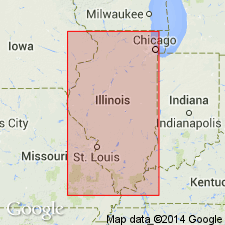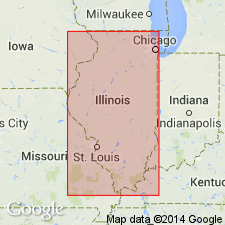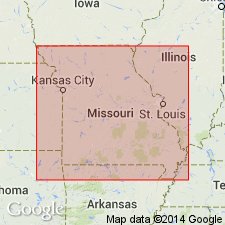
- Usage in publication:
-
- Abernathy Member
- Modifications:
-
- Original reference
- Dominant lithology:
-
- Dolomite
- Sandstone
- Shale
- AAPG geologic province:
-
- Ozark uplift
- Illinois basin
Summary:
Pg. 58-59, 227. Abernathy Member of Joachim Dolomite of Ancell Group (new). Name proposed for basal member of Joachim Dolomite [also called Joachim Formation in text]. Present in southeastern Missouri (absent north of Perry County), southern Illinois, and western Kentucky. Mainly silty sandy thick-bedded dolomite containing layers of dolomitic medium-grained sandstone, and some partings of dark-red-brown shale. Thickness 25.5 feet at type section; 149 feet in well near Pulaski, Illinois; 60 feet at Perryville, Missouri; 95 feet in well near Grand Tower, Illinois. At type section basal 2 feet of Abernathy overlies 1 foot of Dutchtown Formation, but is on upthrown side of a fault. Underlies Augusta Member (new). Age is Middle Ordovician (Champlainian).
Type section: in bluff on north side MO Highway 74, 1.5 mi east of Dutchtown, Cape Girardeau Co., southeastern MO. Type section cut by north-trending fault with downthrow of about 55 ft on east side. Type section supplemented by Midwest Dairy Company well at Cape Girardeau. Named from Abernathy School, 2 mi north of type section.
Source: US geologic names lexicon (USGS Bull. 1350, p. 5); supplemental information from GNU records (USGS DDS-6; Reston GNULEX).

- Usage in publication:
-
- Abernathy Member
- Modifications:
-
- Overview
- AAPG geologic province:
-
- Illinois basin
Summary:
Pg. 53 (fig. O-4), 61 (fig. O-15), 65. Abernathy Member of Joachim Dolomite of Ancell Group. Is basal member of Joachim. Present in subsurface of southern Illinois, extending northward as far as Jackson County. Consists of silty, sandy, thick-bedded dolomite with layers of dolomitic, medium-grained sandstone. Includes some dark brown layers of limestones and dolomites. A persistent layer of St. Peter-type sandstone, 1.5 to 14 feet thick, occurs at top. Chert is common just below the sandstone. Thickness commonly 50 to 100 feet. Lies above Sharpsboro Member of Dutchtown Formation and below Augusta Member of Joachim. Age is Middle Ordovician (Champlainian; Blackriveran).
Source: Publication.

- Usage in publication:
-
- Abernathy Member
- Modifications:
-
- Overview
- AAPG geologic province:
-
- Ozark uplift
Summary:
Pg. 7. Abernathy Member of Joachim Dolomite. Basal member of Joachim Dolomite, overlain by Augusta Member. Is restricted to region of its type section in southeastern Missouri, whereas other Joachim members occur essentially throughout its outcrop area. Elsewhere the Augusta Member is the basal member of the Joachim. Age is [Late] Ordovician (Mohawkian).
See also T.L. Thompson, Missouri Div. Geol. Land Survey, Rpt. Inv., no. 70, pt. 3, 1991, and Missouri Div. Geol. Land Survey, v. 40 (revised), 2nd ser., 1995.
Source: Publication.
For more information, please contact Nancy Stamm, Geologic Names Committee Secretary.
Asterisk (*) indicates published by U.S. Geological Survey authors.
"No current usage" (†) implies that a name has been abandoned or has fallen into disuse. Former usage and, if known, replacement name given in parentheses ( ).
Slash (/) indicates name conflicts with nomenclatural guidelines (CSN, 1933; ACSN, 1961, 1970; NACSN, 1983, 2005, 2021). May be explained within brackets ([ ]).

